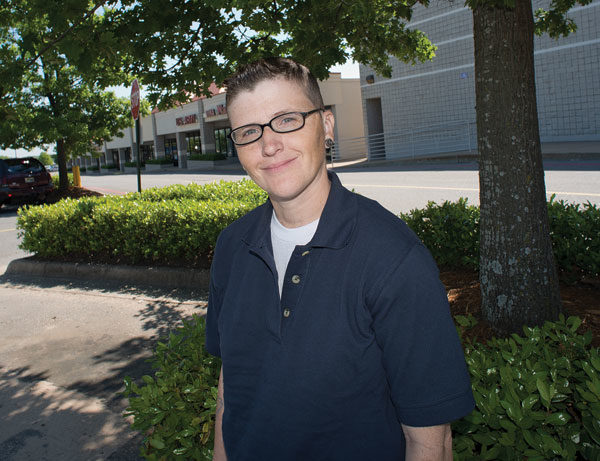The private option has already changed lives.
Resident Dena Kemp is highlighted in the Arkansas Times article about the effect of the Afforable Care Act.
by David Ramsey
Photo by Brian Chilson
Dena Kemp
39, Little Rock“My whole world has changed today,” said Dena Kemp last week, on the day that she found out she is covered by Ambetter under the private option. She had first tried to sign up in January but faced frustrating difficulties with the enrollment process.
Kemp has Crohn’s disease, a severe and incurable immune-related disease that causes extreme diarrhea, vomiting and abdominal pain, as well as a wide variety of additional symptoms outside the gastrointestinal tract. She has been without insurance for more than two years, after a short-term medical leave from a job at a Walmart warehouse ended and she was too sick to go back to work.
Thus began a vicious cycle: Kemp couldn’t afford the care she needed to manage the disease. When things got really bad, she would be forced to go to the emergency room and be hospitalized (at her most sick, sometimes twice a month). She was working waitressing and janitorial jobs, but every time she got too sick, that meant lost hours of work — and the frequent hospitalizations made it hard to convince employers to keep her on. Meanwhile, the medical bills would pile up. Kemp said she owes more than $100,000. “Some they’ve written off, some they’re still trying to collect on,” she said.
Twice, Kemp and her 8-year-old daughter have had to stay in a homeless shelter when they couldn’t make ends meet. “If I don’t have my regular meds, I can’t work,” she said. “I couldn’t pay my bills when I was sick. Not having insurance — that’s the main reason we ended up in a shelter.”
Kemp has managed to keep a waitressing job at a Mexican restaurant since last August, where she works around 30 hours and makes around $250 a week. Her hours have been cut and they no longer schedule her on busy nights because of her hospitalizations.
Now that she has coverage, Kemp is feeling hopeful.
“I would only go to the ER if I was dying,” she said of her years without insurance. “I couldn’t get treatment. They would give me enough nausea, anti-diarrhea and pain medicine for two or three days. Now, if I have my monthly meds, I can still go to work, I won’t lose my job. Now, I can be a mom, I’ll be able to take care of my daughter without help. I can finish school. It’s a whole different world.”
Kemp is attending the Arkansas College of Barbering and is aiming to become a licensed barber in September. She has a job waiting for her at GoodFellas barbershop.
In worst-case scenarios, Crohn’s can lead to colon cancer or a ruptured intestine, potentially fatal. It’s been an endless source of stress for Kemp (which itself can exacerbate the disease) trying to manage the disease without the basic care she needed. Now that she’s covered, she is setting up an appointment with a doctor, eager to find out about a new medicine that came out last year (“there’s no way I could have afforded it before,” she said), as well as a GI specialist, who wouldn’t even see her without insurance. “I should have been to a GI doctor and gotten a colonoscopy four months ago,” she said, when the Crohn’s flared up and became active, “but I couldn’t. Now I can. Now I have peace of mind.”
“For people like me, I don’t make the type of money to go buy my own insurance,” Kemp said. “For me to have affordable health care, it’s like life and death.”

